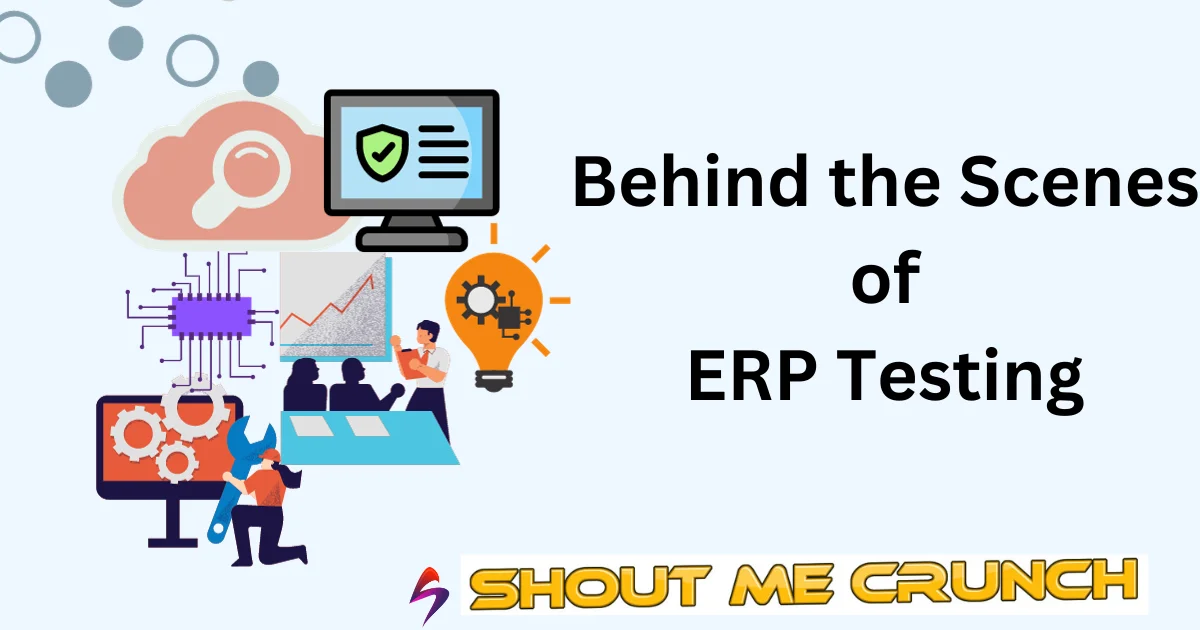ERP testing is an essential part of corporate technology. It aids in the efficient operation of corporate processes. Additionally, it finds faults, ensuring data accuracy in turn. In other words, ERP has become essential if you want to ensure that your operations are trustworthy.
It’s possible to compare the entire ERP software testing process to machine tuning. This is for optimum performance. We will go into great detail about ERP testing in this article. We’ll talk about its significance, advantages, and more. So, let’s get started.
What is ERP testing & its types?
ERP testing is an exacting process. It evaluates ERP systems’ value, functionality, efficiency, and durability. As part of the testing process, the ERP software is put through a series of tests to check for issues. It also ensures precise data verification and smooth system operation. So, the several types of ERP testing are as follows:
Functional testing
The functionality and components of the ERP system are tested to make sure they work correctly. Testers also verify processes like order management and payroll processing.
Security testing
Protecting sensitive business data is paramount. Security testing identifies vulnerabilities and ensures data remains confidential and protected from unauthorized access.
Integration testing
ERP systems often interact with other software and databases. Integration testing ensures seamless data flow between these systems. As a result, it avoids data inconsistencies and errors.
User acceptance testing (UAT)
The ultimate test involves real users navigating the system. So, it is to ensure it meets their operational needs and expectations. While the concept’s significance is apparent, it’s crucial to understand why this testing technique is one of the most popular. We will uncover that ahead.
Why is ERP testing necessary?
Businesses need ERP tests to confirm the efficiency of their ERP systems. Critical procedures will run without a hitch if functionality, performance, security, and integration are carefully assessed. Additionally, ERP testing ensures data accuracy, protecting against expensive errors.
Additionally, it improves data security by spotting possible flaws, fixing them, and bolstering system defenses. Performance testing also evaluates the ERP system’s capacity to manage high workloads, preventing operational lags.
We are aware now that EPR tests cover various testing aspects. But what benefits does the method provide to you? Let’s check it out.
What are the benefits of ERP testing?
ERP testing services are not just a routine task. It’s a strategic investment for businesses aiming to thrive in today’s competitive landscape. This part will look further into the ERP test’s multiple benefits. Let’s examine more closely:
Ensures smooth operations
Necessary operations, including sales, inventories, and money, are managed via ERP systems. Testing also ensures they function properly, preventing disruptions in regular operations.
Saves money
Early problem detection and resolution save money over dealing with difficulties that arise after installation. ERP testing also assists you in identifying and resolving problems before they become expensive.
Keeps data accurate
For making judgments, accurate data is necessary. The ERP test also verifies that data is accurate, eliminating mistakes in computations and reporting.
Compliance
Many industries have rules and regulations. ERP tests also help ensure your system follows these rules, avoiding legal problems and fines.
Improves user experience
Testing makes sure that the system is user-friendly and easy to use. As a result, enhanced user experience results in employee productivity and more contentment.
Boosts confidence
ERP tests build trust in your system. Knowing it has been thoroughly checked gives you confidence that it will work when needed.
Prevents security risks
Testing helps find and fix vulnerabilities. This keeps your business data safe from hackers and unauthorized access.
Saves Time
A well-tested ERP system means fewer problems and less time spent fixing them. Moreover, this frees up time for your team to focus on other essential tasks.
Competitive advantage
A thoroughly tested ERP system can give an organization a competitive edge. This provides a reliable and efficient platform for business operations and decision-making.
We now have a fair idea of its importance for businesses; what about its process? How exactly do we implement it? Let’s find out.

What is the process followed while testing ERP systems?
The ERP software testing process involves various steps to validate its performance. So, here are the critical stages of ERP testing:
Requirement analysis
Understand the ERP system’s functionality and objectives. This is to define testing requirements and scenarios.
Test planning
Develop a comprehensive ERP test plan that comprises the testing strategies. Also, remember to focus equally on the outline, project scope, and other deadlines.
Test design
Create test cases and scripts based on defined requirements. It should cover functional, performance, security, and integration aspects.
Test environment setup
Set up an ERP testing environment to replicate the production environment. This environment may include the data sets, ERP hardware, and software.
Test execution
Run the test cases, record results, and monitor system behavior. Functional testing also ensures individual components work correctly.
Performance testing
Evaluate the system’s response time, scalability, and stability. Moreover, this should be under varying workloads, addressing any bottlenecks.
Security testing
Identify all possible vulnerabilities in the system and ensure data remains confidential from unauthorized access.
Integration testing
Validate seamless data flow between the ERP and various systems, ensuring smooth data consistency.
What practices can you use to guarantee the viability of your efforts? In the next part, we will explore this subject.
What are the best practices for ERP testing?
ERP testing is a critical phase in ensuring the smooth functionality of an Enterprise Resource Planning system. So, to achieve the best results in the testing process, consider the following ERP test best practices:
Robust test planning
Start with a thorough test strategy that includes the goals, boundaries, means of execution, and deadlines. The aims and objectives of the organization for the ERP system should align with this strategy.
Clear test objectives
Establish precise test goals. You must test the functionality, procedures, and situations listed below. Additionally, make sure the objectives align with the organization’s demands.
Comprehensive test data
Create test data sets that are broad, realistic, and represent a range of events and settings. This information needs to cover a variety of company operations and transaction kinds.
Test automation
Utilize test automation tools and scripts to speed up time-consuming, repetitive testing. Automation also improves test coverage and guarantees testing consistency.
Regression testing
Implement a robust regression testing strategy. It is to verify that changes or updates to the ERP system do not negatively impact existing functionality.
Performance testing
Assess the ERP system’s performance under different loads and conditions. It is to identify bottlenecks and scalability issues.
Security testing
Prioritize security testing to identify vulnerabilities. It also ensures that sensitive data remains protected—furthermore, tests for authentication, authorization, and data encryption.
Documentation
Maintain comprehensive documentation of test cases, test results, and any defects. Furthermore, this documentation is vital for traceability and future reference.
You may be concerned about the difficulties you may encounter. Don’t be concerned! We’ve also addressed those issues. Go to the next section to learn more about what to anticipate.
What are the challenges with ERP testing?
ERP testing is a challenging and crucial stage of adopting an ERP system. Moreover, it comes with several challenges that organizations need to address. So, some of the critical challenges with ERP tests include:
Complexity of ERP systems
ERP systems frequently have a large number of modules and sophisticated business processes. Thus, the testing is pretty complex and takes a lot of time.
Data volume and variety
ERP systems deal with vast amounts of data. Testing data migration, accuracy, and consistency across the system can be daunting, especially in large organizations.
Business process changes
Changing existing company procedures significantly while implementing an ERP system is expected. Testing these changes and ensuring they align with the organization’s objectives can be challenging.
User training and adoption
Testing user interfaces and workflows is crucial. However, ensuring employees are comfortable using the new system is equally important. Moreover, resistance to change can be a hurdle.
Integration with other systems
ERP systems often need to integrate with other software applications and databases. As a result, testing these integrations for data consistency and functionality can be complex.
Test data management
Creating and managing realistic test data can be a challenge. Moreover, this is especially true while handling private or delicate information.
Customization and configuration
Many organizations customize their ERP systems to meet specific needs. Furthermore, testing these customizations and configurations requires careful planning and execution.
Change management
Communicating changes and coordinating testing efforts across different teams can be challenging. This is because it requires effective change management strategies.
Vendor support and updates
Dealing with ERP vendors for support and updates can be challenging. This is so because it may involve waiting for vendor fixes or patches to address issues identified during testing.
So, let’s move ahead and look at some case studies to examine the influence the ERP test holds.
ERP testing: Case Studies
In this section, we will look at some case studies of how ERP tests helped companies:
“AutoTech Solutions” Drives Automotive Innovation
The goal of the automotive technology business AutoTech Solutions was to remain competitive. It implemented an ERP system to manage its research and development initiatives effectively. Furthermore, thorough ERP testing, including integration and performance testing, guarantees effective teamwork.
“LogiCo Logistics” Optimizes Supply Chain
Global logistics company LogiCo Logistics was experiencing supply chain issues. They decided to install a successful ERP system. The ERP testing enabled them to streamline their supply chain operations. Additionally, this led to more visibility, more affordable transportation, and better inventory control. As a result, their customer satisfaction and profitability rose.
Conclusion
ERP testing ensures that sophisticated ERP systems handle data reliably and operate as intended. It assists businesses in locating problems and swiftly fixing them. In the end, this saves both time and money. By extensive testing, companies may improve customer happiness, reduce risks, and ensure data security. Testing for ERP is not without difficulties, though.
These issues must be resolved with good planning, communication, and resource allocation. You may use our blog to make wise judgments and be successful. If you want to be sure the testing is done thoroughly, you may also engage expert services. So, why are you still waiting? Start your journey now.
FAQ
Why is ERP Testing Important?
Testing the ERP systems is crucial as it helps in knowing the exact functioning status beforehand. In other words, one concern is whether the system is running well. Furthermore, maintaining smooth integration is essential since it is a complicated procedure.
What are the Key Objectives of ERP Testing?
The following are the critical objectives of ERP testing:
- Identifying & fixing defects that the ERP system may have.
- Ensuring the ERP system is user-friendly and easy to use.
- Verifying if it meets the business requirements efficiently.
- To make sure that the system protects sensitive information.
- Ensuring the system works well under diverse load conditions.
What Are the Different Types of ERP Testing?
The following are the different types of ERP testing:
- Functional Testing
- User Acceptance Testing
- Performance Testing
- Integration Testing
- System Testing
- Usability Testing
- Security Testing
Who Typically Performs ERP Testing?
The answer generally depends on two essential factors: the nature of the company and the particular implementation under process. On the other hand, ERP testing might include a comprehensive set of expertise, including ERP testers, QA engineers, developers, and business analysts.


